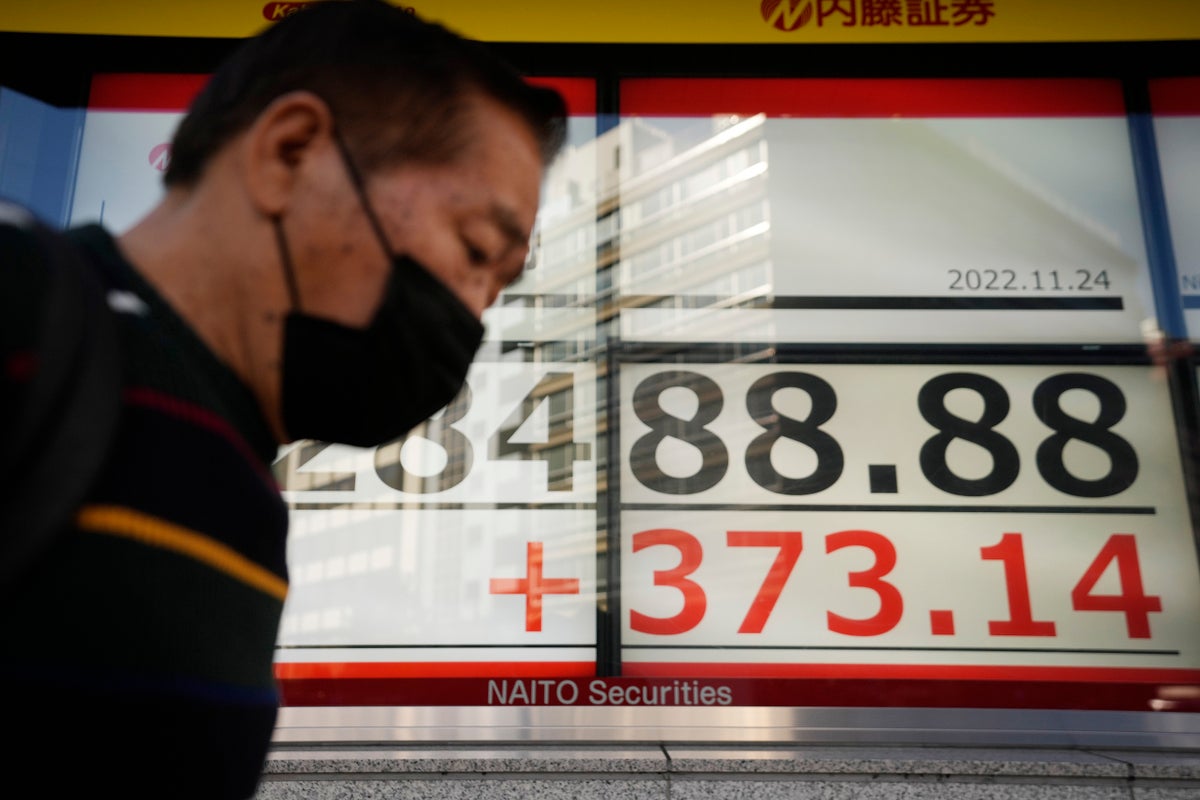
Asian shares gained Thursday, although optimism about the Federal Reserve holding back on aggressive interest rate raises was countered by some uncertainty about coronavirus restrictions in China.
Trading was relatively muted in Asia ahead of U.S. markets being closed for Thanksgiving. Benchmarks rose in Japan, Australia and South Korea. They rose in Hong Kong but fell in Shanghai. Oil prices fell.
“A headwind for Asian markets is the COVID situation in China, where investors seem to be avoiding local assets and commodities as the country is seeing near-record numbers of COVID cases. Broad restrictions will keep weighing on risk sentiment and macroeconomic fundamentals, putting pressure on the outlook for cyclical stocks and commodities,” Anderson Alves at ActivTrades said in a commentary.
Japan's benchmark Nikkei 225 jumped 1.0% to finish at 28,383.09. Australia's S&P/ASX 200 added 0.1% to 7,241.80. South Korea's Kospi gained nearly 1.0% to 2,441.33. Hong Kong's Hang Seng rose 0.6% to 17,626.00, while the Shanghai Composite fell 0.3% to 3,089.31.
Stocks closed broadly higher on Wall Street after minutes from the Federal Reserve's most recent policy meeting showed central bank officials agreed that smaller rate hikes would likely be appropriate “soon.”
That suggests policymakers are seeing signs that inflation may be cooling as the economy slows with more costly borrowing.
The S&P 500 rose 0.6% to 4,027.26, while the Dow Jones Industrial Average gained 0.3% to 34,194.06. The Nasdaq composite closed 1% higher to 11,285.32.
The Russell 2000 index of smaller companies edged higher, adding 0.2% to close at 1,863.52.
Long-term Treasury yields fell. The yield on the 10-year Treasury, which influences mortgage rates, slipped to 3.69% from 3.76%.
At their Nov. 1-2 meeting, Fed officials expressed uncertainty about how long it might take for their rate hikes to slow the economy enough to tame inflation. At a news conference afterward, Chair Jerome Powell stressed the Fed wasn't even close to declaring victory in its fight to curb high inflation. Other Fed officials in the weeks since the meeting have signaled that additional hikes are still necessary.
The central bank’s benchmark rate currently stands at 3.75% to 4%, up from close to zero in March. It has warned that it may have to ultimately raise rates to previously unanticipated levels to cool the hottest inflation in decades.
Wall Street has been closely watching the latest economic and inflation data for any signs that might allow the Fed to ease up on future rate increases. Investors are worried that the Fed could slam the brakes too hard on economic growth and bring on a recession.
Consumer spending and the employment market have so far remained strong points in the economy. That has helped as a bulwark against a recession, but also means the Fed may have to remain aggressive.
Technology stocks and some big retailers helped drive a big share of the gains in the benchmark S&P 500 index Wednesday. Chipmaker Nvidia rose 3% and Target rose 3.5%.
Homebuilders rose broadly following a government report showing that sales of new U.S. homes rose more than expected in October. Lennar gained 1.6% and D.R. Horton rose 2.2%.
In energy trading, benchmark U.S. crude lost 47 cents to $77.47 a barrel. Brent crude, the international standard, fell 66 cents to $84.75 a barrel.
In currency trading, the U.S. dollar fell to 138.87 Japanese yen from 139.57 yen. The euro cost $1.0435, up from $1.0399.







